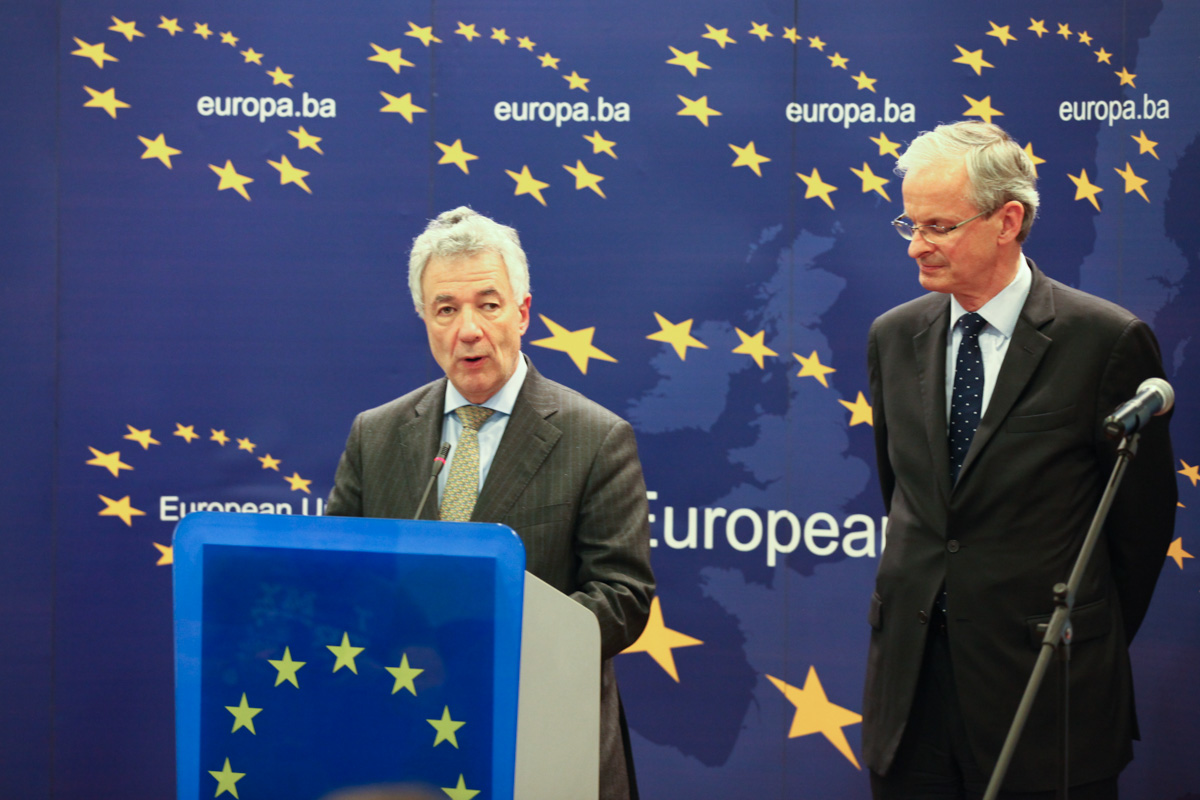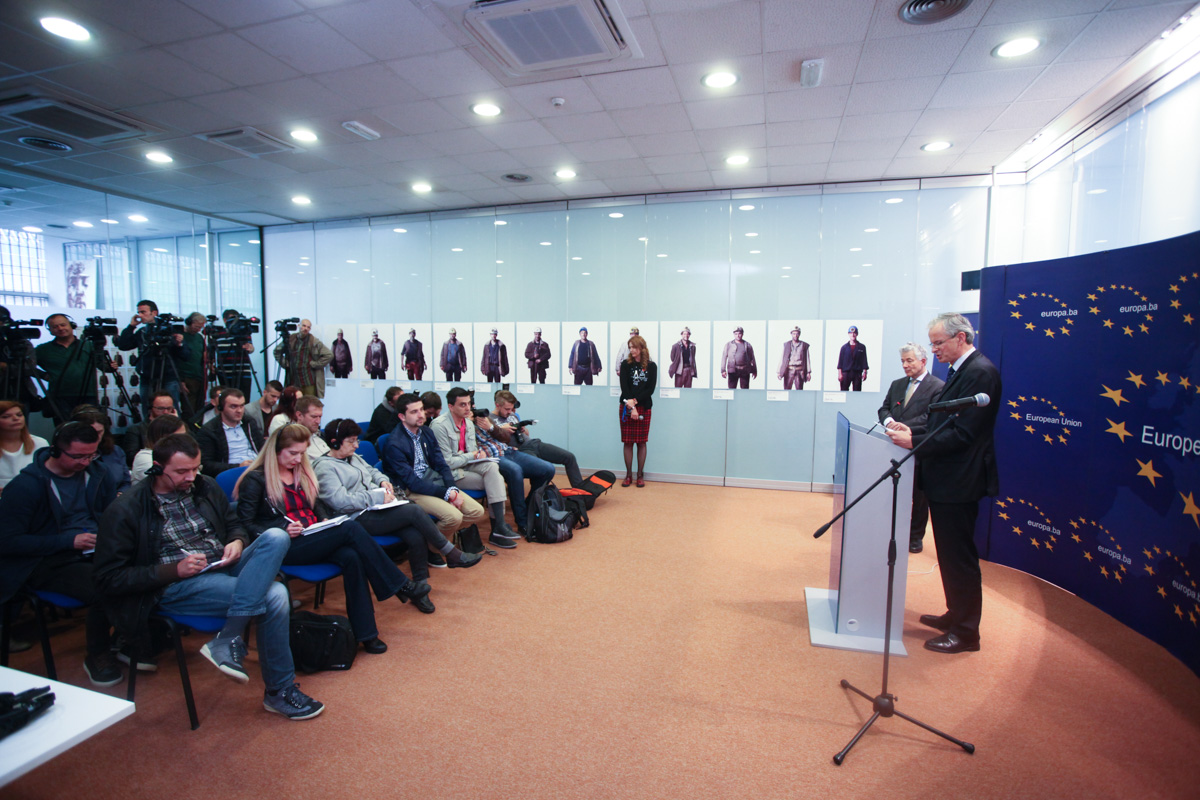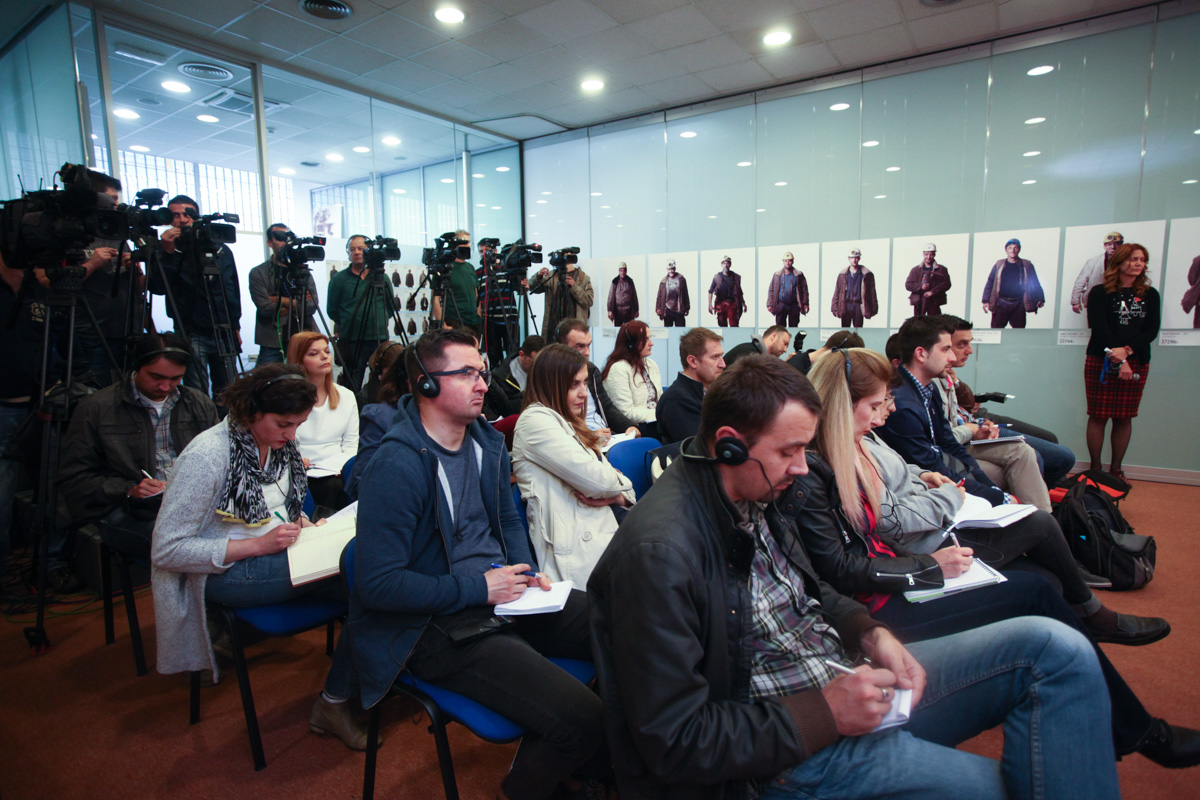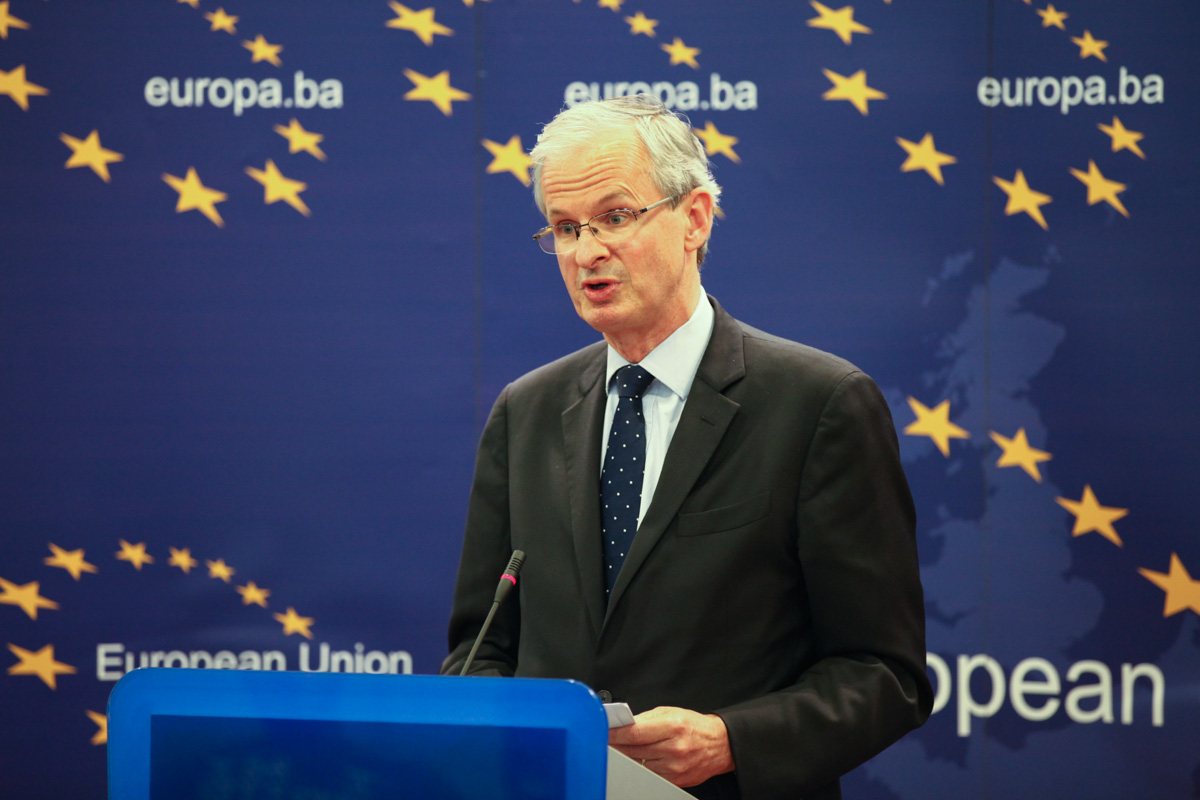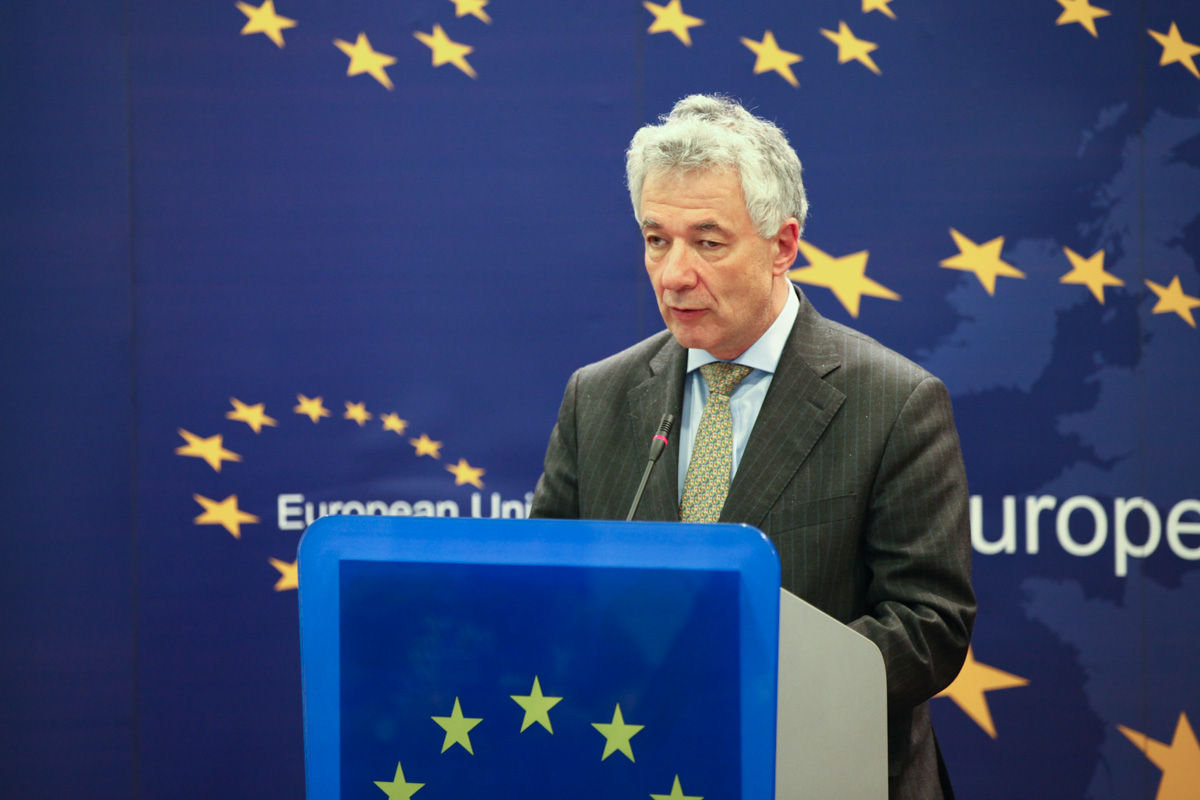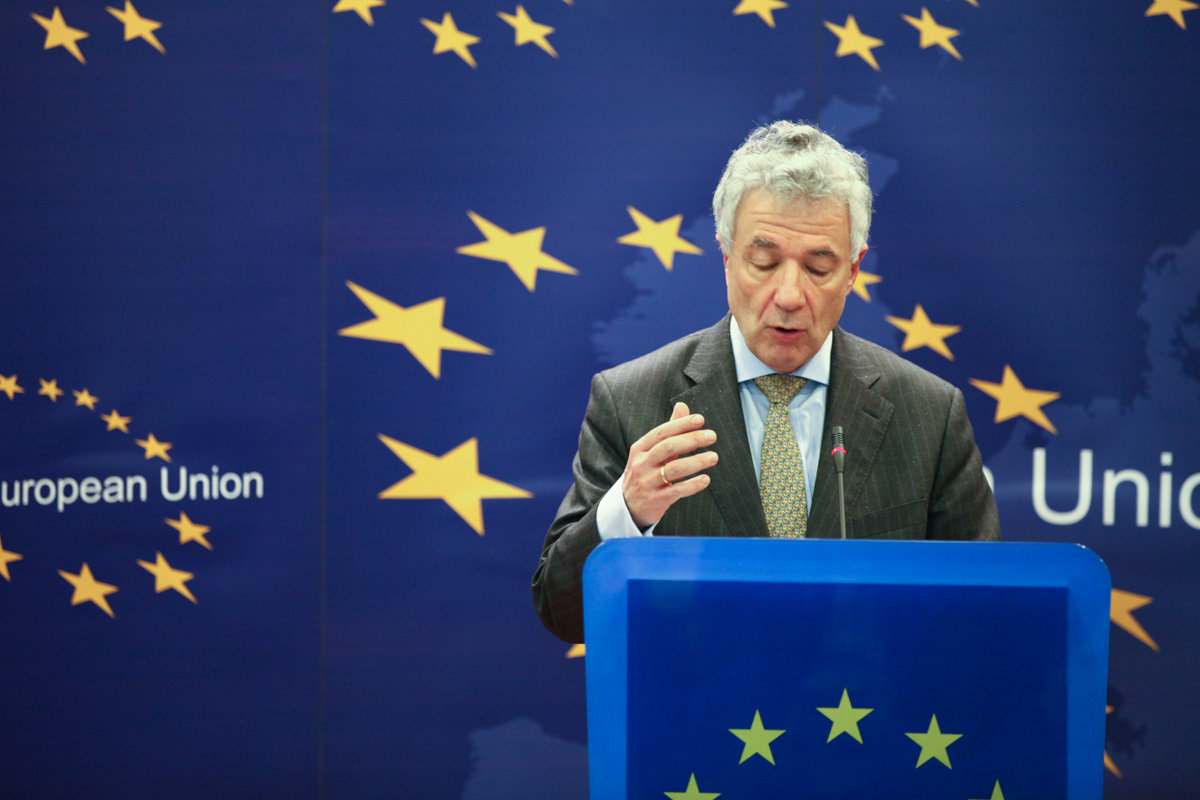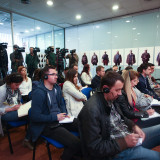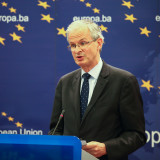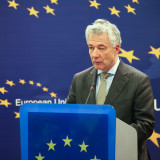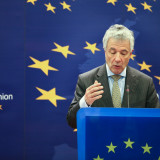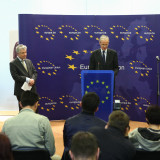[Check against delivery]
Christian Danielsson, Director General in the European Commission DG NEAR: It is a pleasure to be here in Sarajevo today. Together with Mr Mayr-Harting we had open discussions with the leaders of the 14 major political parties in Bosnia and Herzegovina. This is the first time we as EU have met with all the major political parties who signed the written commitment in February 2015 to undertake necessary reforms on your country’s path to the EU.
Our message today is clear and very simple. The EU would like to see Bosnia and Herzegovina progress on its path to the EU. The next steps are now in the hands of the authorities at all levels here in Bosnia and Herzegovina. Political parties, their leaders, and all the institutions they represent – be it at state, Entity or Cantonal level – know what needs to be done for the membership application to receive a favourable response already by July this year. Do it now, or the opportunity may be lost.
The EU integration process requires cross party consensus to deliver on the necessary reforms. This is first and foremost the case for the implementation of the Reform Agenda, which is an essential condition for the EU Member States to consider the application for membership from Bosnia and Herzegovina and ask for the Commission’s Opinion on its merits. The publication of the census results would facilitate the Reform Agenda implementation.
Moreover, a functioning coordination mechanism on EU matters needs to be agreed in order for the country to be able to better interact with the EU, smoothly implement the Stabilisation and Association Agreement and respond to the extensive information requests Bosnia and Herzegovina will be faced with when it proceeds to the next level. Every day without agreement on the coordination procedures is a day lost on the road to EU membership.
We also stressed how Bosnia and Herzegovina is expected to reach an agreement with the EU on the adaptation of the SAA, and in line with the EU traditional trade methodology. Again, let me be clear on this important issue where there are a lot of confusing messages.
The adaptation of the SAA is a legal obligation that follows any new country joining the EU, this time it was Croatia that joined. Adaptations have been carried out with all EU’s trade partners, including Bosnia and Herzegovina’s neighbours, such as Serbia and Montenegro, but also larger countries like, for instance, Russia.
The SAA adaptation is in the mutual interest of both parties and it will be beneficial for Bosnia and Herzegovina. We are here to support your economy, not undermine it. The EU is Bosnia and Herzegovina’s main trading partner with 72% of the country’s exports that goes to the EU. Access to the EU market is already close to being fully liberalised for BiH products.
The adaptation should not be confused with trade liberalisation. The market opening is only expected to the extent that existed already before 1 July 2013, the date of accession of Croatia to the EU. The EU is not asking for new concessions. So, there will be no flooding of EU products on the Bosnian-Herzegovinian market.
On the contrary, there is a lot Bosnian-Herzegovinian authorities and the EU can do together to help strengthen BiH producers’ position on the EU market and support, in particular, the agriculture sector.
Let me here take two examples:
BiH producers can achieve improved access to EU markets. Already last year your milk and dairy producers complied with EU food standards. If all goes well, poultry and other products may soon be exported to the EU market as well. And let’s not forget that the EU is the largest market in the world with over 500 million consumers.
The adoption of country-wide strategy for the agriculture sector in BiH would open the way to further financial assistance from the EU, which has already provided about EUR 25 million to the sector.
Finally, we have together also reassured the leaders of the Commission’s commitment to support Bosnia and Herzegovina’s efforts towards the EU. Policy advice, dedicated technical and extensive financial assistance will continue to be at Bosnia and Herzegovina’s disposal to help the country delivering on the needed reforms and be able to further advance towards the EU, in line with what we feel very strongly are the aspirations of all here in Bosnia and Herzegovina.
And with that I would like to hand over the floor to Ambassador Mayr-Harting.
Thomas Mayr-Harting, Managing Director for Europe and Central Asia in the European External Action Service (EEAS): Thank you very much. I would only like to add the following, that Director-General Danielsson and I are here today on behalf of High Representative Mogherini and Commissioner Hahn to convey what is a very clear message, and this message is that when commitments are made to reform, the European Union reciprocates, and there is also progress on the EU path.
And in this sense it was important that we now met the representatives of the 14 parties that signed up to the Written Commitment, because that is, as you will all remember, exactly what happened the last time. The Written Commitment was made and the European Union reciprocated and made possible the entry into force of the Stabilisation and Association Agreement. And now, basically, we are coming back again with the same message. If the reform requirements that Director-General Danielsson has just listed are met, if this is fulfilled, then the application for membership of Bosnia and Herzegovina will be treated further in the Council and the Commission will be asked for an Opinion on this application.
A number of important reform steps have already been made. Director-General Danielsson has already referred to the meaningful implementation of the Reform Agenda, the completion of SAA adaptation, and a functioning coordination mechanism that is important for the country not only to be a member of the European Union one day, but you already need this coordination mechanism, in fact even to answer the questions that the Commission will ask in the framework of elaboration of its Opinion.
The other point we made today is that basically in these things there is always a window of opportunity. You have a propitious situation to which Director Danielsson already referred in the beginning of July, with the new Presidency of the European Union taking over, and that Presidency is willing to move forward along the lines that I have described. But for that, the decisive steps need to be taken here, and because of the complexity of the matters and the complexity of the procedures, these steps in fact need to be taken in the very next weeks.
We were encouraged by the commitment of all party representatives we just met to take this matter forward and we look forward to continuing to support Bosnia and Herzegovina in its next steps on its path towards the European Union.
Journalist questions:
Q1: Aleksandar Crkvenjaš, RTRS: You have a meeting with RS President Milorad Dodik in half an hour or so, what are you going to talk about?
Danielsson: We are having meetings today with various leaders here in Bosnia and Herzegovina and we are repeating the same issue, namely the importance to Bosnia and Herzegovina to focus on what needs to be done in order to be able to move forward on the path of the European agenda. That is what we are going to talk to Dodik about, that is also what we are going to bring up in our meetings with the Presidency and with the other leaders.
Q2: Željka Domazet, Glas Srpske: The Central Census Bureau is trying yet again today to adopt a unique methodology for census, with no success in sight, what will happen with Bosnia and Herzegovina if two and a half years since the census was conducted thee results are nowhere to be seen?
Danielsson: The census is an important element in the process, it has taken some time, it might take some more time. We have from our part only underlined that it is a good thing to have let it happen, because the latest census was many years ago. And this is important in view of the framing of policies and getting the knowledge of where people live and how many people live throughout the country, so that is the situation. I cannot comment on the internal process here in Bosnia and Herzegovina.
Q3: Armin Išanović, FACE TV: How is it possible for a state aspiring to become an EU Member State to not conduct elections in one city, particularly in Mostar?
Danielsson: The issue of the elections in Mostar is of course an internal issue here in Bosnia and Herzegovina, and I think we have a full confidence in the BiH to address that issue, and that will lead to an agreement which is acceptable for all that are concerned. On the question that you raised how, now BiH is not a Member State, it is an aspiring EU Member State and from that angle I do not think that Mostar is a major issue to be honest.

